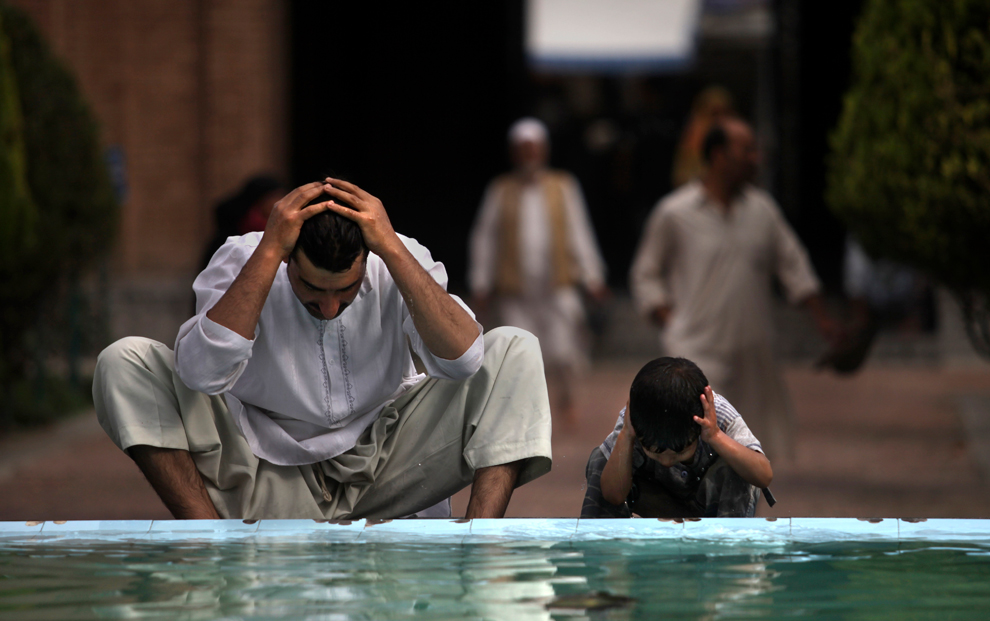حَدَّثَنَا عَبْدُ اللَّهِ بْنُ مَسْلَمَةَ بْنِ قَعْنَبٍ، حَدَّثَنَا سُلَيْمَانُ، – يَعْنِي ابْنَ بِلاَلٍ – عَنْ عَبْدِ اللَّهِ بْنِ عَبْدِ الرَّحْمَنِ، عَنْ عَامِرِ بْنِ سَعْدِ بْنِ أَبِي وَقَّاصٍ، عَنْ أَبِيهِ، أَنَّ رَسُولَ اللَّهِ صلى الله عليه وسلم قَالَ “ مَنْ أَكَلَ سَبْعَ تَمَرَاتٍ مِمَّا بَيْنَ لاَبَتَيْهَا حِينَ يُصْبِحُ لَمْ يَضُرَّهُ سُمٌّ حَتَّى يُمْسِيَ ” .
Amir b. Sa’d b. Abu Waqqas, on the authority of his father, reported Allah’s Messenger (ﷺ) having said: He who ate seven dates (of the land situated) between these two lava plains in the morning, no poison will harm him until it is evening. (Sahih Muslim)
حَدَّثَنَا يَحْيَى بْنُ يَحْيَى، أَخْبَرَنَا هُشَيْمٌ، ح وَحَدَّثَنَا أَبُو بَكْرِ بْنُ أَبِي شَيْبَةَ، حَدَّثَنَا شَرِيكُ بْنُ عَبْدِ اللَّهِ، وَهُشَيْمُ بْنُ بَشِيرٍ، عَنْ يَعْلَى بْنِ عَطَاءٍ، عَنْ عَمْرِو بْنِ الشَّرِيدِ، عَنْ أَبِيهِ، قَالَ كَانَ فِي وَفْدِ ثَقِيفٍ رَجُلٌ مَجْذُومٌ فَأَرْسَلَ إِلَيْهِ النَّبِيُّ صلى الله عليه وسلم “ إِنَّا قَدْ بَايَعْنَاكَ فَارْجِعْ ” .
Amr b. Sharid reported on the authority of his father that there was in the delegation of Thaqif a leper. Allah’s Apostle (ﷺ) sent a message to him: “We have accepted your allegiance, so you may go.” (Sahih Muslim)
وَحَدَّثَنِي أَبُو الطَّاهِرِ، وَحَرْمَلَةُ، قَالاَ أَخْبَرَنَا ابْنُ وَهْبٍ، أَخْبَرَنِي يُونُسُ، عَنِ ابْنِ، شِهَابٍ عَنْ أَبِي أُمَامَةَ بْنِ سَهْلِ بْنِ حُنَيْفٍ، عَنْ أَبِيهِ، أَنَّ رَسُولَ اللَّهِ صلى الله عليه وسلم قَالَ “ لاَ يَقُلْ أَحَدُكُمْ خَبُثَتْ نَفْسِي . وَلْيَقُلْ لَقِسَتْ نَفْسِي ” .
Abu Umama b. Sahl b. Hunaif, on the authority of his father, reported Allah’s Messenger (ﷺ) as saying: “None of you should say: ‘My soul has become evil,’ but he should say: ‘My soul has become remorseless.'” (Sahih Muslim)
حَدَّثَنَا أَبُو كَامِلٍ الْجَحْدَرِيُّ، حَدَّثَنَا عَبْدُ الْوَاحِدِ، – يَعْنِي ابْنَ زِيَادٍ – حَدَّثَنَا أَبُو مَالِكٍ الأَشْجَعِيُّ عَنْ أَبِيهِ، قَالَ كَانَ رَسُولُ اللَّهِ صلى الله عليه وسلم يُعَلِّمُ مَنْ أَسْلَمَ يَقُولُ “ اللَّهُمَّ اغْفِرْ لِي وَارْحَمْنِي وَاهْدِنِي وَارْزُقْنِي ” .
Abu Malik Ashaja’i reported on the authority of his father that whenever a person embraced Islam, Allah’s Messenger (ﷺ) instructed him to recilte: ” O Allah, grant me pardon, have mercy upon me, direct me to the path of righteousness and provide me sustenance.” (Sahih Muslim)
حَدَّثَنِي أَبُو غَسَّانَ الْمِسْمَعِيُّ، مَالِكُ بْنُ عَبْدِ الْوَاحِدِ حَدَّثَنَا بِشْرُ بْنُ الْمُفَضَّلِ، حَدَّثَنَا سُهَيْلُ بْنُ أَبِي صَالِحٍ، قَالَ سَمِعْتُ ابْنًا، لأَبِي سَعِيدٍ الْخُدْرِيِّ يُحَدِّثُ أَبِي عَنْ أَبِيهِ، قَالَ قَالَ رَسُولُ اللَّهِ صلى الله عليه وسلم “ إِذَا تَثَاوَبَ أَحَدُكُمْ فَلْيُمْسِكْ بِيَدِهِ عَلَى فِيهِ فَإِنَّ الشَّيْطَانَ يَدْخُلُ ” .
The son of Abu Said al-Khudri reported on the authority of his father that Allah’s Messenger (ﷺ) said: “When one of you yawns, he should keep his mouth shut with the help of his hand, for it is the devil that enters therein.” (Sahih Muslim)
حَدَّثَنِي زُهَيْرُ بْنُ حَرْبٍ، حَدَّثَنَا بِشْرُ بْنُ السَّرِيِّ، وَعَبْدُ الرَّحْمَنِ بْنُ مَهْدِيٍّ، قَالاَ حَدَّثَنَا سُفْيَانُ، عَنْ سَعْدِ بْنِ إِبْرَاهِيمَ، عَنْ عَبْدِ الرَّحْمَنِ بْنِ كَعْبِ بْنِ مَالِكٍ، عَنْ أَبِيهِ، قَالَ قَالَ رَسُولُ اللَّهِ صلى الله عليه وسلم “ مَثَلُ الْمُؤْمِنِ كَمَثَلِ الْخَامَةِ مِنَ الزَّرْعِ تُفِيئُهَا الرِّيَاحُ تَصْرَعُهَا مَرَّةً وَتَعْدِلُهَا حَتَّى يَأْتِيَهُ أَجَلُهُ وَمَثَلُ الْمُنَافِقِ مَثَلُ الأَرْزَةِ الْمُجْذِيَةِ الَّتِي لاَ يُصِيبُهَا شَىْءٌ حَتَّى يَكُونَ انْجِعَافُهَا مَرَّةً وَاحِدَةً ” .
Ka’b b. Malik reported on the authority of his father that the similitude of a believer is that of a standing crop. The wind sometimes shakes it and sometimes raises it up and then it comes to its destined end. And the similitude of a hypocrite is that of a cypress tree which is not affected by anything but is uprooted once for all. (Sahih Muslim)
وعن عمرو بن شعيب، عن أبيه ، عن جده رضي الله عنهم قال: قال رسول الله صلى الله عليه وسلم: “ليس منا من لم يرحم صغيرنا، ويعرف شرف كبيرنا” ((حديث صحيح رواه أبو داود والترمذي، وقال الترمذي: حديث حسن صحيح)).
Amr bin Shu’aib on the authority of his father who heard it from his father reported: Messenger of Allah (ﷺ) said: “He is not one of us who shows no mercy to younger ones and does not acknowledge the honour due to our elders”. (Tirmidhi and Abu Dawud)
وَعَنْ خَلَّادِ بْنِ اَلسَّائِبِ عَنْ أَبِيهِ - رضى الله عنه - أَنَّ رَسُولَ اَللَّهِ - صلى الله عليه وسلم -قَالَ: { أَتَانِي جِبْرِيلُ, فَأَمَرَنِي أَنْ آمُرَ أَصْحَابِي أَنْ يَرْفَعُوا أَصْوَاتَهُمْ بِالْإِهْلَالِ } رَوَاهُ اَلْخَمْسَةُ، وَصَحَّحَهُ اَلتِّرْمِذِيُّ, وَابْنُ حِبَّانَ 1 .
Khallad bin as-Sa’ib narrated on the authority of his father, “The Messenger of Allah (ﷺ) said: ‘Jibril (peace be upon him) came to me and told me: ‘Command your Companions to raise their voices when saying Talbiyah.'” (Tirmidhi)
وَعَنْ عَمْرِو بْنِ شُعَيْبٍ, عَنْ أَبِيهِ, عَنْ جَدِّهِ قَالَ: قَالَ رَسُولُ اَللَّهِ - صلى الله عليه وسلم -{ كُلْ, وَاشْرَبْ, وَالْبَسْ, وَتَصَدَّقْ فِي غَيْرِ سَرَفٍ, وَلَا مَخِيلَةٍ } أَخْرَجَهُ أَبُو دَاوُدَ, وَأَحْمَدُ, وَعَلَّقَهُ اَلْبُخَارِيُّ.
Amr bin Shu’aib narrated on the authority of his father, on the authority of his grandfather (RAA), that the Messenger of Allah (ﷺ) said: “Eat, drink, wear clothes and give sadaqah but with neither extravagance nor pride.” (Abu Dawud)
“وَعَنْ بَهْزِ بْنِ حَكِيمٍ, عَنْ أَبِيهِ, عَنْ جَدِّهِ: قَالَ: قَالَ رَسُولُ اَللَّهِ - صلى الله عليه وسلم -{ وَيْلٌ لِلَّذِي يُحَدِّثُ, فَيَكْذِبُ ; لِيَضْحَكَ بِهِ اَلْقَوْمُ, وَيْلٌ لَهُ, ثُمَّ وَيْلٌ لَهُ } أَخْرَجَهُ اَلثَّلَاثَةُ, وَإِسْنَادُهُ قَوِيٌّ. ”
Bahz bin Hakim narrated on the authority of his father, on the authority of his grandfather that the Messenger of Allah (ﷺ) said: “Woe to him who lies in his talk to make the people laugh, Woe to him! Woe to him!” (Tirmidhi)


[…] View Reddit by TheMuslimShrink – View Source […]
Is there an underlying reason for posting these hadiths? I understand the mission of your blog is to build strong male figures, but I think I’m missing the message here. I only see hadiths that just happen to be narrated by son from their fathers.